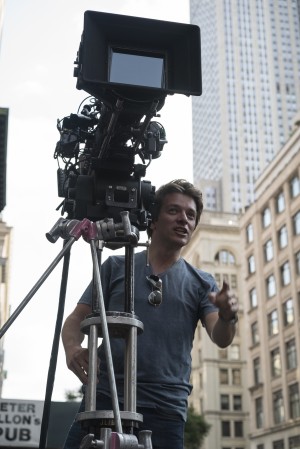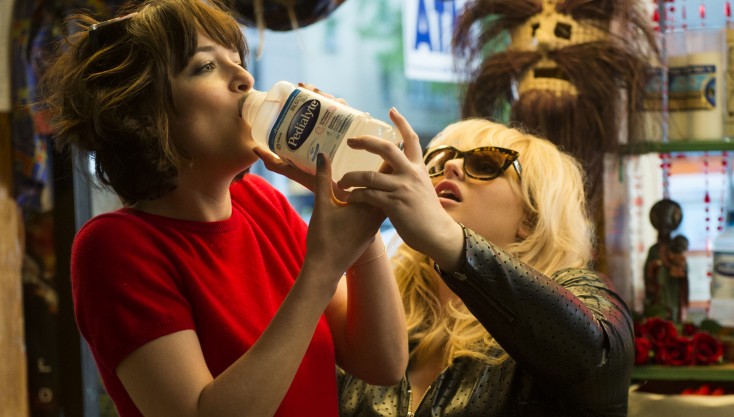
Director Christian Ditter on the set of HOW TO BE SINGLE. ©Warner Bros. Entertainment. CR: Nicole Rivelli.
By ANGELA DAWSON
Front Row Features
HOLLYWOOD—Christian Ditter says being single is something everyone around the world can relate to, which is why his new feature film, a Hollywood romantic comedy, “How to Be Single,” can be enjoyed by audiences around the world.
The 38-year-old German filmmaker resembles a young Michael J. Fox circa “Back to the Future,” for an interview. Wearing a grey hoodie and jeans, he also reveals a boyish enthusiasm, even though he also is married and a father.
With “How to Be Single,” very loosely based on the Liz Tucillo novel of the same name, the New York City set film delves into the lives of four single women, navigating the rolling and sometimes choppy waters of dating and relationships. At the center is Alice, played by “Fifty Shades of Grey” star Dakota Johnson, who is “taking a break” from her longtime boyfriend, Josh, whom she has been dating since college. Hoping to decide whether Josh is “the one,” she ventures into a new job, a new city—New York—a newly unattached life and all that goes with that. At the law firm where she works as a paralegal, she meets wild-and-crazy Robin (“Pitch Perfect” star Rebel Wilson), who leads Alice directly into Manhattan’s exciting nightlife scene. Unlike sexually naïve Alice, Robin relishes being single, getting drunk every night at the city’s hottest clubs, sleeping with different men and basically enjoying being young.
Leslie Mann (“Vacation,” “Knocked Up”) plays Alice’s older, workaholic obstetrician sister, who has a great job, a comfortable apartment but seemingly no time for romance or starting a family. That is, until she gets hold of one a patient’s toddler one day and instantly wants to become a mother herself. About the same time she become pregnant through IVF, she meets a much younger guy, who seems too good to be true. Her natural instinct is to try and push him away, but he is determined to convince her he wants her and to be a family.
Finally, Alison Brie (“Mad Men,” “Community”) plays Lucy, a tightly wound single woman, who approaches dating much like a math problem. She is looking for a very specific kind of guy, which she eventually realizes is limiting her options.
The Alice role initially was going to be played by Lily Collins, with whom Ditter had cast in his first American feature film, “Love, Rosie,” a romantic drama. But when Collins’ schedule didn’t work out, producer Dana Fox suggested Johnson, whom she had worked with on the TV sitcom “Ben and Kate.” Johnson, of course, had become a white-hot in-demand actress following her daring performance in the big screen adaptation of “Fifty Shades of Grey.”
Although best known for its S&M themes, Ditter also saw Johnson’s gift for comedy timing in that performance, and thought she would be perfect for the role of Alice. He spoke at a trendy Hollywood hotel about working on his first big budget Hollywood romantic comedy, his leading ladies and whether he plans to return home to Germany to continue the career he began there less than a decade ago.
Q: Rebel usually does a lot of improvisation, and she said you were very technical. Did you rein her in a little bit?
Ditter: Well, I’m from Germany, so I kind of have to be a little bit precise, because that’s what everybody expects from me. I’m a pre-planning kind of guy so when I come to set I always have a shot list and I figure out how to block it and light it and everything. When I came to set and Rebel was there, I just threw everything overboard because she has so many brilliant and, frankly, great ideas that I learned how to stay flexible, which is great. Oftentimes, we ended up with a scene that was more than I had hoped for in the beginning, and more than we had planned for. But I think it’s good that we have a Plan A that we can abandon so we can go to Plan B.
Q: The gender politics of this romantic comedy is different from previous Hollywood rom-coms. Was that part of the appeal of directing this film?
Ditter: I don’t theorize too much about taking on projects or not. When I read a script and connect to it on a personal level, and I’m still thinking about it the next day and the next week, then that’s always a sign that this is a project that would be interesting. For me, when I read the script for “How to Be Single,” I wondered, “Why hasn’t anyone shown me that movie when I was single, because it’s so much fun and you learn a lot. It hasn’t been made before. It’s also really funny but it also has an emotional, heartfelt story that you could relate to, and that I certainly related to. It also makes it very cinematic because there’s a lot of funny stuff on TV so you have to ask yourself, “What is it that elevates a movie above a sitcom,” and, for me, that (the heartfelt story) is what it is.
Q: What was your experience working in New York? Had you lived there before?
Ditter: I’ve never lived in New York. I’ve been there as a tourist. When I went there, I’ve taken a lot of photos. I’m a visual guy. Christian Rein, the DP, and I go back a long we. We used to make films together in film school. We have a similar sensibility in images and tastes and stuff like that. When I started working on this project, I dug out the photos I took as a tourist and the things that particularly interested me. I wanted to get a feel of the city (in the movie) as I did when I visited (there as a tourist). I wanted to make the city feel real and look real.
In figuring out how I wanted to light this with good, classy images that felt real. We wanted to connect to today’s audience and emulate that for them. We wanted the film to have a personally visual appeal.
Q: Can you talk about the casting of the women?
Ditter: As a director, I try to cast to what’s true to the script as possible. The characters have different functions. For Dakota’s character, it was very important to have somebody who had a good sense of humor, which she has, and timing and comedy chops, but at the same time is very accessible and very emotionally open because she’s our emotional anchor. We had Rebel for the hilarious comedy and Alison’s character is a little more exaggerated than Dakota’s character.
On the second day of shooting, we shot the scene where Dakota’s character is (dumped) by Josh’s character in the café. We were filming her close up, which we did in one take. Our DP Christian (Rein) was holding the hand-held camera very close and Josh was giving his breakup speech and I was watching Dakota’s facing (and noticed) how she listens, and how I saw what he was saying sinking in. I saw her eyes catching up with his words. That was so powerful, I knew on that second day we had a movie, not a sitcom. I thought, “We might encounter problems (down the road on the shoot) but we’re in good shape.” Then when we got Rebel, I knew we had, obviously, a comedy. (He laughs.)
Q: The role of Alice was cast before you came onboard, right?
Ditter: The only actress that was cast before I joined the movie was Lily Collins, who the studio saw in my previous film, “Love, Rosie.” They asked her and me to do the film, and then we had to postpone the shooting for various reasons so, unfortunately, the schedules didn’t work out. Then the other ladies came onboard one after the other, but I’m very happy with the cast we’ve assembled now.
Q: Did the producer push for Dakota, because they’ve worked together before?
Ditter: That’s true. And the producer also is a writer on the project, Dana Fox.
She did a TV series with Dakota. When it looked like Lily couldn’t be part of the movie anymore, Dana suggested Dakota. She told me Dakota is an amazing actress and asked me to take a look at her. I knew who she was but at that point, I hadn’t seen “Fifty Shades of Grey.” So I watched that and while that wasn’t exactly my type of movie, I loved what she did to make the scenes lighter, adding comedy to them, and I could see what she could bring to our movie.
Q: That film didn’t dissuade you from putting her into a more naïve role?
Ditter: Not at all. What I saw when I watched “Fifty Shades” was a very talented actress.
Q: Leslie Mann said it took a long time to shoot the scene with her and the baby, and that you used multiple babies on that set. What were you looking for that took so long?
Ditter: To film the scene took forever. It was Leslie’s first day (on set). She is like Hollywood royalty. I thought after two hours of trying to get the scene, they were going to fire me and bring in a new director the next day. (He laughs.) But she was very patient and lovely. What I wanted from that scene was a connection between Leslie and the baby. Frankly, most of the babies just cried. I tried to minimize the technology around them but still, it was a very small room, and they didn’t like being taken away from their parents, and that’s a frightening thing for a little kid. I have kids myself so I know how it is. I also don’t want to be the one to traumatize a kid. So I prepared for that (inevitability) by having more than one baby. The problem was they all cried.
Q: Have you gone completely Hollywood now or are you going to go back and make films in Germany?
Ditter: That’s a very good question and a question my wife asks me every other day. I really enjoyed the experience here and I think there are so many talented and creative people here, that it was a really amazing experience. I also have some opportunities coming up that are very attractive so there is a good chance that I might be staying a little bit longer (in the U.S.).
Q: What do you like about working in Hollywood?
Ditter: I only can be as good as the people I’m working with, my crew. Everybody is so good here. When I walked anywhere on set, I was amazed. They’d worked with Spielberg. They’d worked with Scorsese. They’d worked with Alfonso Cuaron. People I’ve admired. Between takes, I’d just go to them and ask them questions. It was like a Master Class. It was like an extended film school on my own movie. And I’m a great collaborator. I invite everybody on set to bring me good ideas because the worst thing I could do is reject it, but if it’s great, I can use it. It was just a treasure trove of good ideas from great people.
Q: Will this film’s subject matter—being single in 2016—translate in Germany and the rest of Europe and even Asia?
Ditter: Yes, of course. My single time in Munich and Berlin was the same thing.





